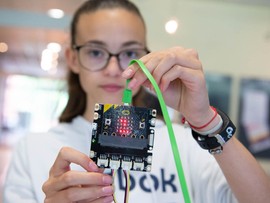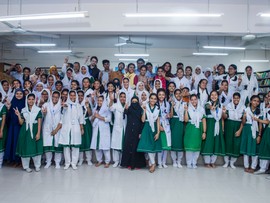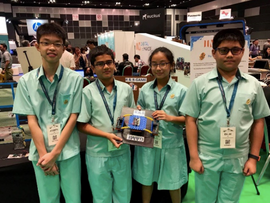Universiti Teknikal Malaysia Melaka
Training university students to mentor pupils and teachers in Malaysia, to foster excitement and interest in computing with micro:bit and bring this into the community
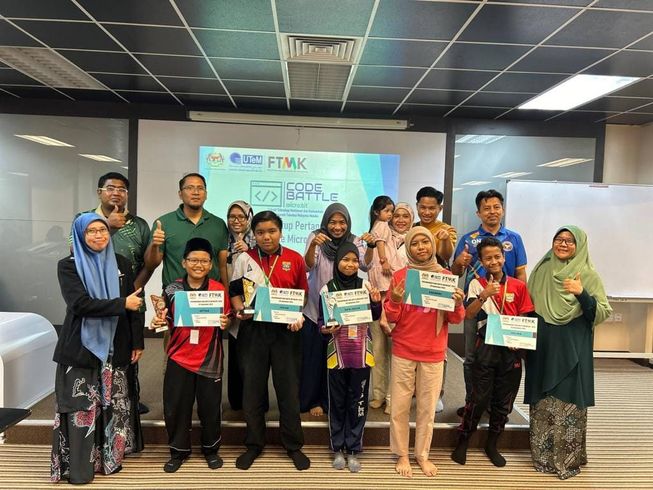
At the Universiti Teknikal Malaysia Melaka (UTeM) an impactful micro:bit mentor programme has been running, which has trained over 100 student volunteers and impacted over 1000 teachers and students within a year. The Micro:bit Educational Foundation supported these initiatives by providing essential resources and facilitating impactful workshops.
UTeM is a leading technical vocational education training (TVET) university dedicated to advancing education through innovative programmes and hands-on learning experiences. With a strong emphasis on STEM (Science, Technology, Engineering, and Mathematics) education, UTeM has launched several initiatives to engage university students and foster a passion for these fields. The micro:bit mentor programme is one of these initiatives, encouraging proactive student engagement and collaborative efforts in order to share their passion for STEM with their local communities, and support teachers and pupils in schools around Malaysia.
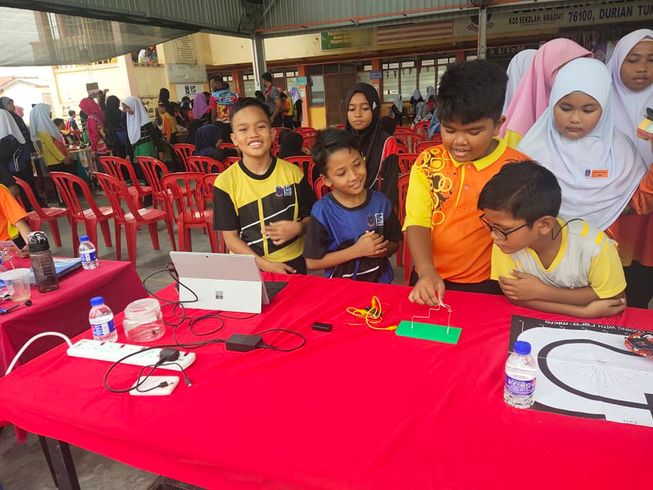
Connecting the university to the local community with micro:bits
Dr Raja Rina, Senior Lecturer at the Faculty of ICT, UTeM, saw an opportunity to enhance school STEM education through hands-on micro:bit activities, foster university student interest in STEM fields, and develop a sustainable mentorship programme.
Schools in Malaysia have a primary school curriculum requirement to deliver coding and robotics teaching, but have limited time available to cover these subjects thoroughly. With such a short time requirement, teachers were keen to find support to deliver this teaching in their classrooms. Meanwhile, university students at UTeM are enthusiastic about volunteering in the community, using their areas of expertise. They are motivated by the opportunity to receive recognition from community programmes, which not only offer a fulfilling experience but also enhance their future prospects.
Dr Rina saw the potential for the micro:bit to bridge these needs. By delivering a mentorship programme, university students volunteer and could gain valuable skills and credit, and schools would get highly knowledgeable and enthusiastic support to deliver their computing curriculum.
By connecting with the state education department, more schools could also be reached, which helped to spread the word even further. And schools are so grateful that they often provide additional tokens of appreciation to the dedicated volunteer students, such as corporate gifts or even monetary rewards.

There needs to be a“win-win” ecosystem - volunteers get credit and certificates and schools get the support and guidance they need to deliver teaching. This helps to make the program scalable and sustainable.

Dr Raja Rina, Senior Lecturer at UTeM
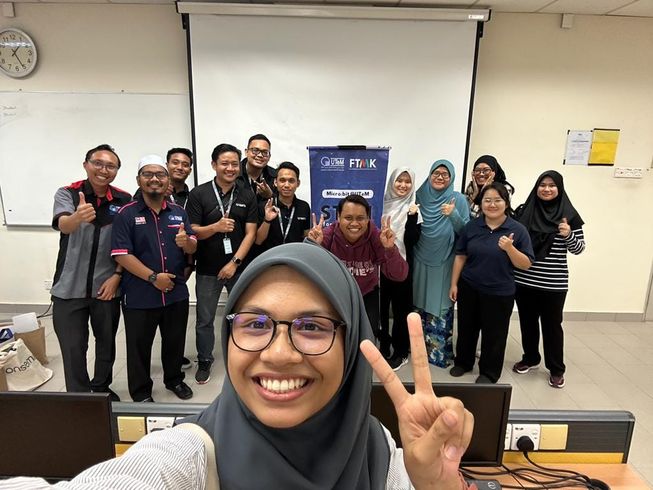
Mentoring and workshops
The projects were structured around a series of workshops and events, with university students acting as mentors. These mentors received training sessions and utilised educational resources and lesson plans curated from online resources. Programme development was marked by collaborative events with state education departments and corporate partners, including the Student body for Faculty of ICT, UTeM and other community organisations, leading to a noticeable increase in student-driven initiatives. A core set of 75 micro:bits are held at UTeM, that can be loaned out to schools around Malaysia, so that those who can’t afford them can still access them.
A key component of the programme structure is the training of student volunteers who then go on to conduct workshops and organise micro:bit Code Battle competitions in schools. The workshops are held every semester to train new and upskill existing volunteers.
After their training, these volunteers frequently participate in state-level STEM carnivals, often organised by various other organisations and schools, which have seen growing demand. A common format for these half-day workshops includes training sessions followed by the micro:bit Code Battle competition. This competition allows students to participate using the micro:bit simulator, enabling those without physical micro:bit devices to practice and prepare. The popularity of these workshops is evident, with requests coming in almost every month for STEM carnivals.
Positive feedback from participants and educators highlighted the growing interest in STEM programmes within the community. Student mentors have proactively started to approach Dr Rina to participate in events, indicating a shift towards more engaged and enthusiastic participation. This format not only helps in spreading STEM education but also provides hands-on experience to the volunteers, further enhancing their skills. In addition, if there are requests by schools, the volunteers will assist to mentor the school teams for innovation and robotic competitions. One of the significant milestones was the success of teachers incorporating micro:bit into Physical Education, winning gold medals in educational innovation competitions.
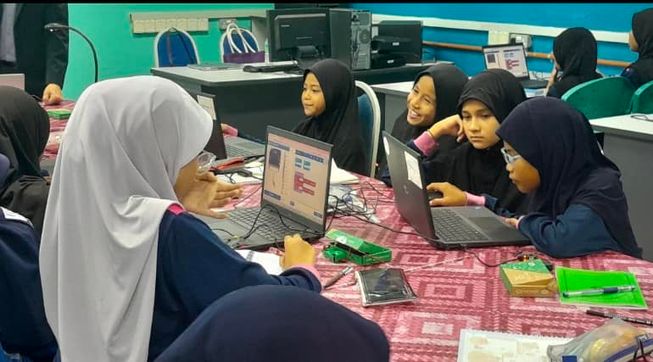
Impact
- Over 100 student volunteers trained
- 25 events participated in since November 2022
- Over 1000 teachers and students impacted (in 1 year)

The knowledge and expertise provided have had a significant impact on both students and teachers, especially in increasing their interest in STEM fields. This workshop has been a turning point for the students' creativity. They have been able to produce simple projects through the workshop and expand these projects into innovations related to their surrounding issues. Furthermore, the guidance from the workshop facilitators (mentors) has also benefited the teachers' skills, making them more confident in teaching Programming and RBT projects. Additionally, we have been able to participate in several competitions and have achieved success. Our school has even been identified to be made a micro:bit hub by the Melaka State Education Department.

Teacher Muhammad Nasrul bin Abu Bakar, SK Merlimau (Merlimau Primary School, Malacca).

Unlocking the potential of the micro:bit in education sparks a digital revolution, empowering students to code their ideas into reality and shape the world around them.

Afifah An Nur binti Hazlan, student mentor
Future plans
The popularity of the programme shows no sign of slowing. Dr Rina aims to expand and enhance the programme by training more university students to grow the volunteer team, developing advanced training modules, and strengthening partnerships with industry to provide additional resources. This aligns with UTeM's goal of empowering Technical and Vocational Education and Training (TVET) and career advancement by equipping students with practical skills and career opportunities.
Dr Rina also plans to incorporate emerging technologies, like artificial intelligence and the internet of things, into the training modules, to promote research, innovation, commercialisation, and entrepreneurship (RICE). By supporting teachers and students through these advancements, the programme contributes to the university's growth while enhancing the community.
Workshops will continue to take place in schools during August and September, providing an opportunity to showcase the benefits of the mentorship program and continue building a strong connection between UTeM and the local community. By continually adapting and expanding these initiatives, UTeM is committed to fostering a robust and sustainable ecosystem for STEM education.
